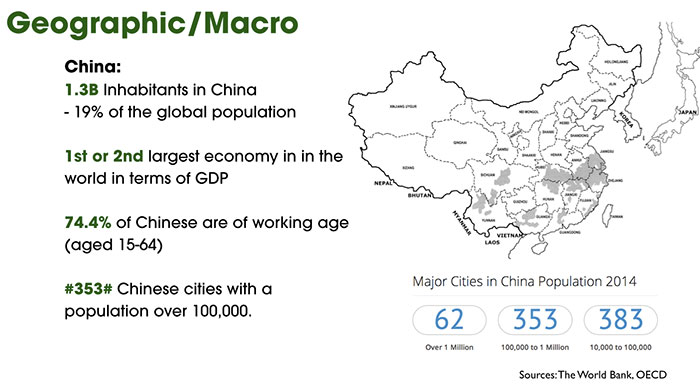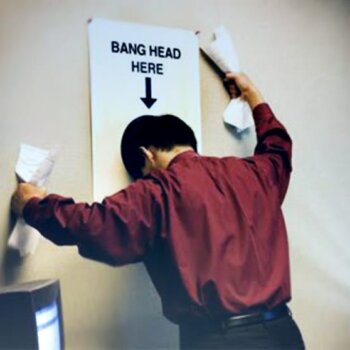Without a doubt, the startup scene in China is extremely active. It’s borderline crazy about startups, VCs and related topics.
Personally, I’ve been to some 50+ startup events and worked with literally hundreds of entrepreneurs and startup supporters over the last year. There are hundreds of startup, tech and other events infusing Chinese cities on nearly a daily basis.
From the perspective of Startup Weekend, an international 54-hour startup business creation event, where I am our principal China Regional Dev Lead, 2015 was our most active period ever in China.
From all these events and working with startups and corporations around innovation, I’ve had a number of interesting conversations that have helped me gain an perspective on what’s happening in China’s startup scene.
In this post and for the sake of future posts on China, I’d like to share a quick overview about China, some broad generalizations about China and Chinese and some things I consider noteworthy about China’s startup scene. Hopefully this post will set a few things in place for deeper dives into China’s Startup Community, Ecosystem, and Future.
Some Important Macro-Level Facts about China
It is extremely difficult to characterize China (and its startup scene) for various reasons, but mainly: It’s huge. It’s diverse. It’s changing.
Here are some basic facts about China:
- 1.3B Inhabitants in China - 19% of the global population
- 1st or 2nd largest economy in in the world in terms of GDP
- 74.4% of Chinese are of working age (aged 15-64)
- 353 Chinese cities have a population over 100,000.
On a macro-level, China is a dominate player but its economy is fragile and not particularly structured towards economic independence yet.
Keeping Things in Perspective: China’s business scene is huge and fragmented
Even with its size, it’s important to note a few things about China:
Major regional differences: China is huge yet fragmented. People in different parts of China speak, act and orient themselves differently, meriting more of a regional or continental approach over purely national strategy. There is no such thing as “one China,” and companies can’t assume a national strategy.
Demographics Matter: Educational level, age, international experience, and wealth matter more a lot in China. You need to think about someone’s background and current status in order to conceptualize the best way to work with some. People wear personas, and where some is from and where they are situationally matter in China.
Little Interpersonal Trust: Historically and contemporaneously Chinese have very little trust between themselves. This creates challenges of legitimacy and trust for any company or brand in China. This is one of the most important things to remember about working in China: Trust is not assumed. You need to create and protect a situation of mutual interest and values more than mutual and assumed trust.
Business Culture: Even through historical periods (like mid-Century Communism and Collectivism) have had experiments with planned economies, Chinese people in general have always been and continue to be entrepreneurial. They like to drive their own future and are aspirational. There is a strong business culture in China, though with slightly different rules and practices compared to the West.
Active Startup Scene: While influenced by Western elements, China’s isolation and unique culture have created a divergent form of startup culture, both more commercial and more opportunistic. In some ways there are two major startup circles in the world: China and the rest of the world (The West). The last few years have seen a significant increase in the concept, events and importance of startups and ventures in China. There have also been some heavily funded ventures and VC firms in China.
What about China’s Startup Scene?
In general, I’d say China has some amazing talent, some great products and teams, and yet some challenges and limits remain:
Fragile: In particular the startup scene is characterized by its fragility and lack of collaboration, teamwork and open sharing, helping, etc. Startup Culture is weak.
Predatory: Like the general lack of trust in China, there are a number of predatory elements in China startup scene, including fake investors, fake mentors and special “training schools.” All of them create a slowdown and lead to a lot of confusion. This hinders some of China’s best talent from success and shared learning. It also creates the impression that there are certain “insiders” that can just make things happen without typical business development cycles. The “lottery ticket” mentality towards business leads to youngsters look for it and elders sometimes manipulating it.
Lack of Good Mentorship: China’s fresh entrepreneurs are especially lacking in good mentorship. Culturally, successful entrepreneurs do not necessarily come back and help the next generation of talent and start-up-ers. There are exceptions but I’d say the general status remains of few and not readily accessible, #givefirst elder entrepreneurs. This leads to a serious lack of knowledge sharing in the startup scene. Young entrepreneurs attempt their own businesses with few local resources to help them. Early stage investment is not reliable and tends to be “dumb” rather than “smart” money.
Conclusion: Some Lessons Learned about China and Its Startup Community Situation
I’m a huge fan of Brad Feld and his writings about Startup Community and other topics. Brad’s Boulder Thesis is an amazing crystallization of how to understand and build startup communities. Especially important is the concept that startup communities and ecosystems need to be led by entrepreneurs. Many players support and feed that community, but ultimately it is the entrepreneurs who need to be the leaders and drivers of a startup scene.
Unfortunately, for China, one of the big challenges to this thesis is the concept of community. Personally, I’ve been obsessed by definition and functional aspect of community in society and decision making for awhile.
While the definition of community goes beyond this post, it’s important to realize the community is not a universalistic concept but cultural one. As such, different cultures, languages, religions, legal systems, etc. evolve they provide a different framework for how individuals and groups fit together. These, in turn, structure how we go about making decisions and taking actions–individually and collectively.
In the case of China, there is no real community here. Instead we have a series of small groups that reflect something like a “community situation”. This might have to do with the problems of trust, but I think it goes deeper and connects to China’s past and culture of a clan, family-led society. People tend to trust and work most closely with their family unit. This has been a huge driver of progress in China’s economy too.
As an organization and person, my mission has been to help try to push and create open, inclusive, collaborative startup communities around China. This is not easy with such entrenched cultural norms. I still believe in this mission, but we’ve had to accept certain realities as we grow our activities and as we cultivate people in that community.
I’d say largely Chinese cities, neighborhoods and companies are creating startup silos. They try to find and run all of the elements of a thriving startup ecosystem but by having it all internal and not necessarily opening up to a larger community with others together. This model creates the perception of a “full-stack” startup community. It is a weak form. These various companies end up with a few suboptimal programs and fail to focus on one main area. We also miss opportunities to work with other groups, companies and individuals and their speciality and focus. We fail to complement each other and try to take up the roles in all areas.
For Techstars, UP Global and Startup Weekend, we cannot push our version of community upon China just yet, though we can run programs and work with partners that believe and support the embryonic steps towards that vision of what we think works best.
China’s startup scene is hyper active right now. While strong in some areas (talent, capital and regulations) and weak in many other areas (culture, hubs), it’s an energetic time to be involved in China.
Personally, I’m excited to be involved in the genesis of China’s latest startup scenes. I’m also aware that this genesis will be painful at times. It will reach plateaus, take odd and nonproductive turns and sometimes fail. But like any startup, these startup scenes will eventually pivot towards its optimal state or they will fail and we will have to try again. Hopefully we will be there along the way to help guide the birth and maturity of China’s startup ecosystem.
_________________________________
About the Author
This article was written by Mark Koester, who runs Regional Development for Techstars in Greater China. Mark Koester is a life-long-learner, teacher, traveller, Drupal-er, hacker, polyglot, writer, mystical atheist contributor of free and open source software and community guy.
He is originally from Omaha, Nebraska and has been living abroad for nearly a decade, including significant time in France, Spain, China and Southeast Asia. Where have I been? He is rather nomadic but likely these days to be found somewhere in China or Asia.
Mark is passionate about open source technologies and entrepreneurship. He runs his own web development shop (Int3c.com) with a focus on Drupal. He hopes to return soon to pursuing his latest startup, Diverific! See more.





























